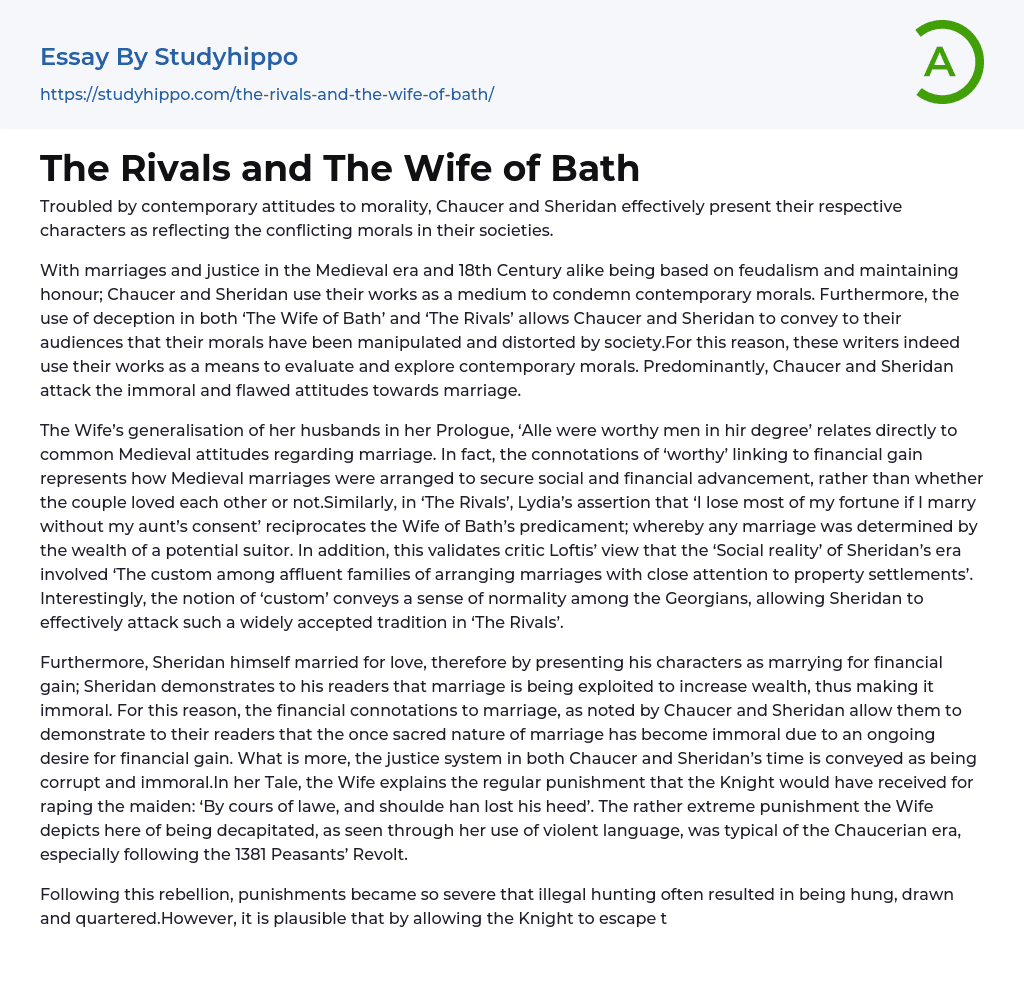Chaucer and Sheridan skillfully use their respective characters to demonstrate the conflicting morals found in their societies, which deeply troubles them.
Chaucer and Sheridan use their works to critique the feudal system and honor-based justice present in both medieval times and the 18th century. They also condemn contemporary morals, utilizing deception in "The Wife of Bath" and "The Rivals" to demonstrate societal manipulation of morals. Through their writing, Chaucer and Sheridan evaluate and explore contemporary morals, specifically targeting flawed attitudes towards marriage.
The Wife of Bath's view that 'Alle were worthy men in hir degree' in her Prologue reflects common medieval beliefs about marriage. This suggests that marriages were often arranged to secure social and financial gains, rather than for love. Similarly, Lydia's statement in 'The Rivals' that 'I lose most of my fortune if I marry without
...my aunt's consent' mirrors the Wife of Bath's situation, where marriage depended on the wealth of potential partners. This supports Loftis' idea that affluent families in Sheridan's time arranged marriages with a focus on property settlements as a social norm or 'custom'. Sheridan challenges this tradition in 'The Rivals', suggesting it is widely accepted but possibly problematic.
Both Chaucer and Sheridan demonstrate through their works that marriage is being exploited for financial gain, thus making it immoral. Although Sheridan himself married for love, his characters are presented as marrying for money to highlight this issue. Chaucer similarly acknowledged the financial connotations of marriage, indicating that the once sacred nature of marriage has become corrupted due to the ongoing desire for wealth. Furthermore, both authors depict the justice system of their respective eras as corrupt and immoral. In her Tale
the Wife of Bath describes the punishment that the Knight would have faced for raping the maiden, demonstrating the extreme penalties common during the Chaucerian era, particularly following the Peasants’ Revolt of 1381.
After a rebellion, punishments for illegal hunting were harsh, often resulting in hanging, drawing and quartering. The Wife in Chaucer's work potentially represents the author's lack of support for the justice system by allowing a knight to escape death. This view is supported by critic Stone who sees the Wife as a special representative of Chaucer, expressing his views on morality through her. Similarly, the justice system in "The Rivals" is portrayed as ineffective and immoral. During the 18th century, duelling was used to settle disputes among the upper class, but it mainly served to uphold honor rather than enforce justice, highlighting its flawed nature.
Sheridan and Chaucer both condemn the corruption of justice systems in their eras, as represented through Bob Acres' line "Your honour follows you to the grave!" which uses an exclamation mark to emphasize the belief held at the time that duelling was a fair way to administer justice. Similarly, lying and deception are themes used by both writers to denounce contemporary morals. In "The Rivals", Lucy embodies this lack of morality with her aside to the audience: "Commend me to a mask of silliness, and a pair of sharp eyes for my own interest under it!". Although Sheridan depicts Lucy as deceitful, it can be argued that this is meant to reflect the structure of the Comedy of Manners rather than an attack on society's morals.
Lucy's sly and cunning characteristics in The Comedy of Manners ridicule the sophisticated
classes. This raises the question whether Sheridan uses Lucy only for the play's structure or if he explores morality through her character. Similarly, Chaucer may present the Wife as deceitful to reject misogynist views of women prevalent in the Medieval era. The Church played a significant role in shaping social attitudes during Chaucer's time, and women were often viewed negatively due to Eve's actions in the Garden of Eden.
The repentant tone of the Wife in her admission of manipulating one of her husbands in the line, “O Lord! The peyne I dide hem and the wo,” is seen as a complement to Ellis’ view that the Wife is a reflection of Medieval anti-feminism. Chaucer’s portrayal of the Wife as a deceitful character serves to uphold stereotypes about women while also defying them by depicting her as headstrong. The theme of deception allows both writers to critique contemporary morals, particularly chauvinistic views towards women. Ultimately, through their works, both Sheridan and Chaucer examine societal values of love and justice, which are often overshadowed by immorality despite being central to Medieval and Georgian societies.
Moreover, the conspicuous falsehoods among the characters, which may have been meant for humoristic reasons, actually demonstrate how ethical values have been disregarded to the point where individuals are willing to hide the truth from their significant others. Consequently, instead of being a platform for preaching about morality, both 'The Rivals' and 'The Wife of Bath' seem to be a call to action from Sheridan and Chaucer to set aside material riches and prestige and prioritize love, fairness, and ethical principles.
- Jurisprudence essays
- Social Injustice essays
- Juvenile Justice essays
- Agreement essays
- Business Law essays
- Common Law essays
- Community Policing essays
- Constitution essays
- Consumer Protection essays
- Contract essays
- Contract Law essays
- Copyright Infringement essays
- Court essays
- Crime essays
- Criminal Law essays
- Employment Law essays
- Family Law essays
- Injustice essays
- Judge essays
- Jury essays
- Justice essays
- Lawsuit essays
- Lawyer essays
- Marijuana Legalization essays
- Ownership essays
- Police essays
- Property essays
- Protection essays
- Security essays
- Tort Law essays
- Treaty essays
- United States Constitution essays
- War on Drugs essays
- Adoption essays
- Aunt essays
- Babies essays
- Bedroom essays
- Caring essays
- Children essays
- Daughter essays
- Divorce essays
- Dog essays
- Dysfunctional Family essays
- Family Tradition essays
- Family Values essays
- Father essays
- Foster Care essays
- Friends essays
- Grandparent essays
- Home essays




